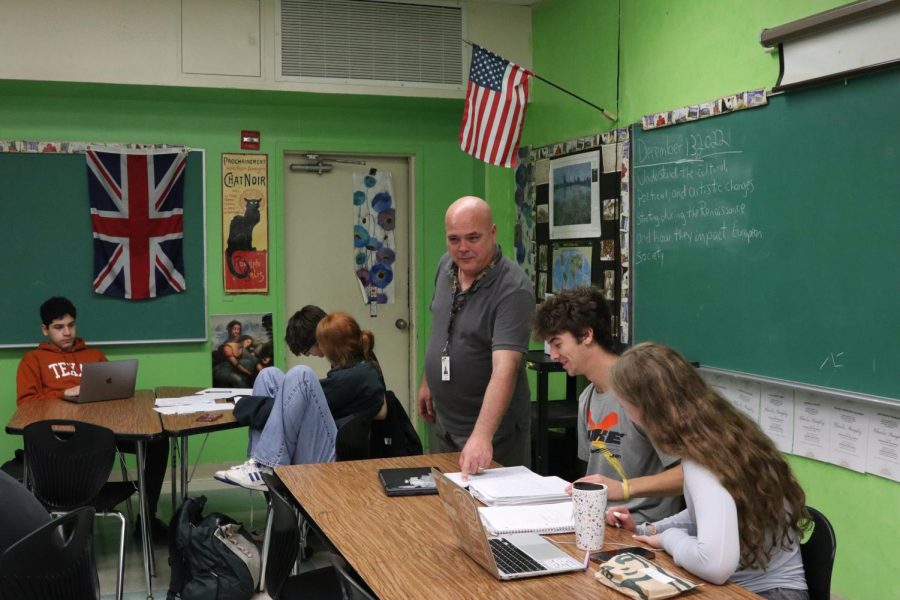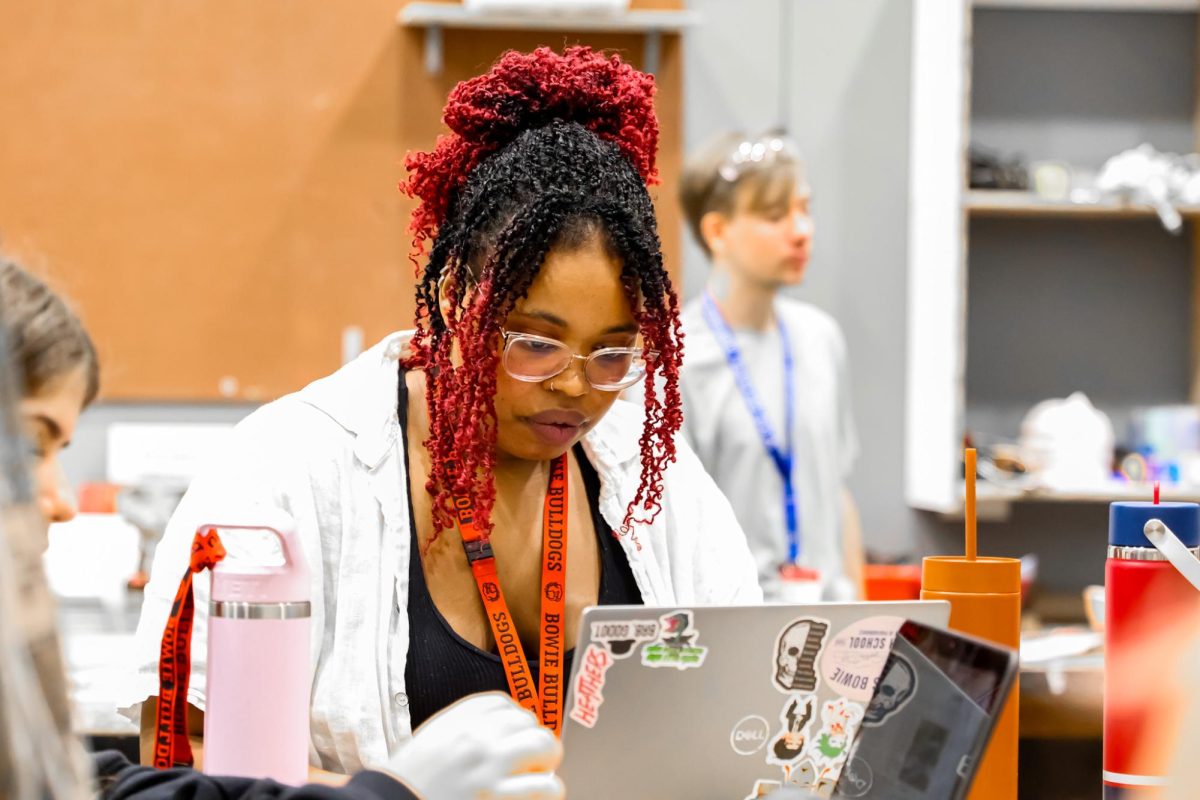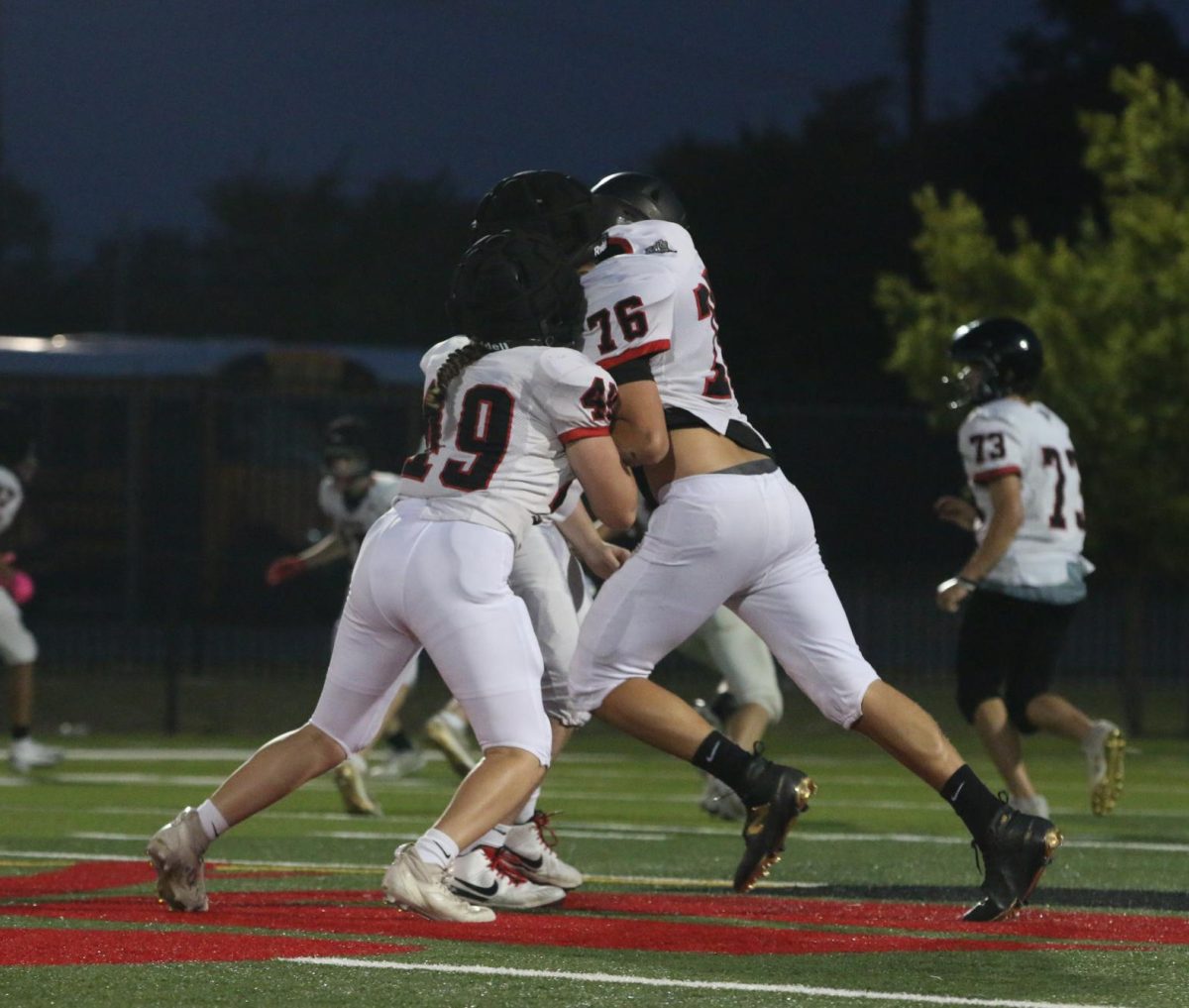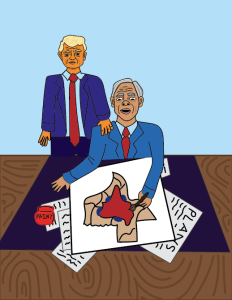Social studies teacher recalls years of service in U.S. Navy
ASSISTING A STUDENT: Social studies teacher Charles Stampley enlisted himself into the U.S. Navy at the young age of 18 and retired as a major. The years spent in the military have given Stampley an awareness of other cultures, and he incorporates this knowledge into his everyday teaching.
January 10, 2023
Examining the battlefield, Social Studies teacher Charles Stampley wonders what this conflict has in store for the near future, with the violence surrounding him on the daily any moment could be his last.
Stampley was a part of the U.S. Navy for six years, and retired as a Major. After retiring as a veteran, Stampley began working at Bowie in 2014.
“When I was in high school, on my senior skip day I went and joined the Navy,” Stampley said. “All the kids in my class, and all my friends went to the lake to drink beer since the legal drinking age was 18 at the time, but instead I went and joined the Navy.”
The Desert Storm was a war where Iraq invaded Kuwait with the backing of the United States from 1990-1991. Stampley explains how the process works for soldiers to earn higher ranks..
“In the military, you have enlisted soldiers or sailors,” Stampley said “These people go and sign up to join the military. An officer [which is a higher rank] is somebody who goes through ROTC in college, for which you actually need a bachelor’s degree.
After the war, Stampley became a history teacher, eventually finding himself at Bowie.
“Not knowing history is detrimental to our country,” Stampley said “ I think students should know about their government’s history, and the history of other countries is very important as well. I’ve seen people killed because they don’t understand Arab culture. You have to understand a little bit about their culture. You can’t just show up and not know.”
War has had an impact on Stampley in different ways. The primary things he recalls most are around his family and appreciating the small moments in life.
“The big thing that being around combat and seeing violence is I learned to appreciate little things, you know, little things that people take for granted,” Stampley said “Every day is a blessing, spending time with family, friends, drinking coffee, talking to students and that stuff. When you’re around violent stuff, and you see people hurt, the fact that you’re here is just a bonus”
Stampley was in the Navy at a time when there wasn’t a very efficient way to communicate with a loved one. In the past, communication was limited to sending letters and waiting on a response.
“A big problem that people in the military have is they’re separated from their families,” Stampley said. “Being separated from my wife and son, it was very hard, but you try to keep yourself busy. You can write home now with the Internet, it’s easier to get in touch with families. When I was first in the Navy, I didn’t have the Internet, you’d sit there and wait for that letter that might even take two or three weeks.”
Assistant Principal Hector Munoz was a part of the war in Iraq and was stationed at a base right across the river from Stampley. He explains how the war affected him in his youth.
“As a young person, I always knew I wanted to go into the military,” Munoz said. “I went to war as [a 19 year old] Delta Corp, and ran around in a tank. I soon learned I didn’t want to die, and I think it’s weird when you say that because no one wants to die. When you’ve had experiences where I’ve said out loud, ‘Mom I love you, I’m sorry’, because the next second could have been easily my last second on this planet.”
Social Studies Department Chair, Wendy Uzzle explains what it was like to run the department with a veteran as a teacher. Many news articles have been written on the topic that the film industry makes war look patriotic and people take pride in their country by serving in the war. Stampley has seen first-hand how damaging that lack of knowledge can be when it comes to real fighting.
“As a World History teacher, Mr. Stampley has a better understanding of the conflict in the middle east over the last few decades,” Uzzle said “It is easy as Westerners to distill the conflict there to a few events, but he understands the nuances in cultures and is better equipped to teach content to students in a more meaningful way.”
Uzzle further explains why Stampley is more than fit for the classes he teaches here at Bowie and why that makes him such a valuable resource when it comes to educating young people about other countries.
“Mr. Stampley was a great fit to teach the AP Comparative Government a course that returned to our course offerings this year,” Uzzle said “His experience working as a contractor for the U.S. military gives him the wider knowledge of how different countries work, and he brings a great deal of knowledge to the classroom.”
Stampley’s time in the Navy came with many cultural experiences that shaped his identity as a teacher and his ability to pass on his historical knowledge.
“Americans assume people in other countries want to be American, but that’s not really true. They want to be kind of left alone, they have their own culture,” Stampley said “They may like Americans, or like help from us but they don’t want to be Americans. Being respectful of other cultures and other religions is very important in the classroom.”









